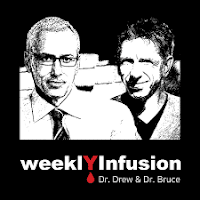Please skim this podcast recommendo list, and see if you can't find something else to pay attention to for a while. America can lose it's shit without your help for a few years, right?
A lot of these are going to be from the BBC, thought by many to be the most objective observer of global events, but it's not all just news. Every radio program the BBC produces is also downloadable as a podcast, and they don't care whether you live in the UK or not.
BBC Global News. Yes, they will probably mention some stuff that America does, but that part is usually a brief summary, and is easily skippable if you can't take it. But did you hear about the avalanche in Italy that swept an entire hotel down a mountain last week, and the rescuers skiing two hours through blizzard conditions to save people? Probably not, right? BBC, man. Thirty minutes long, updated daily.
The Why Factor. Why do we wear ties? Why do people hoard things? Why do we write farewell letters? Why can't we trust eyewitness testimony? Every episode covers one subject of curiosity. Each weekly episode is around twenty minutes long.
Under the Influence. A weekly podcast from Terry O'Reilly, a career veteran in advertising, telling noteworthy stories about getting people to buy things. It's a really good story teller that can make any subject compelling, and that's O'Reilly. Stories about marketing always involve human psychology and sociology, and that means you, man. Know thy enemy. Thirty minutes long. Great theme music, too.
Radiolab. Jad Abumrad and Robert Krulwich host this weekly series of science-related stories, both current and historical. Lavish audio production keeps it moving quickly, even when they do a long-format documentaries. Usually about an hour long.
Mastertapes. John Wilson talks with artists about career-defining albums, fielding questions from the live audience. New episodes "fortnightly", heh. Love the English.
Skeptoid. Every week, creator and host Brian Dunning separates fact from fiction about one topic. Cryotherapy, dietary supplements, anything sold, promoted, or said by Gwyneth Paltrow. Each episode is completely referenced with scientific data and other reliable evidence. Around fifteen minutes per episode.
The Documentary. Just like it says on the tin. A weekly show about pretty much anything. Episodes are about forty five minutes long, with no shouting or name calling. Nice, huh?
In Our Time. Every week, Melvyn Bragg covers everything there is to know about historical events with a roundtable of experts on that subject. Mary Queen of Scots? Yep. The crazy popularity of Gin in the 18th century? Also yep. It's like an hour long, and if you're not completely fascinated with the week's subject, you may find yourself skipping it. I don't blame you. But when it's on, it's so on.
Here's the Thing. Alec Baldwin interviews artists about their careers. However smart you think Baldwin is, he's probably smarter. The discussions never get sycophantic or ass-kissey, which is good. I recommend starting with the Billy Joel episode. Joel makes fun of himself freely, and it turns out he does excellent impressions.
Witness. "The story of our times told by the people who were there" says the summary. The advent of microwave ovens, Russia's "dog man", Apollo 8, The Breakup of the Soviet Union, all told with no second- or third-hand information. About fifteen minutes long, with new episodes weekly.
Discovery. Stories about science, how it happens, and how the human race learns new things. Never boring. Mesmerism, Testosterone- "Elixir of Masculinity", the origins of human culture, "The City that Fell Into the Earth", can your immune system make you psychotic or depressed?
Seriously... Another documentary show, but more heavily flavored with the personalities of the hosts. Less formal than The Documentary, mentioned above. Why do older people take up music lessons? Death row inmates, after being exonerated. The history of exams. About 30 minutes long, and episodes are only available for thirty days before being replaced, so get on it.
The Way I Heard It. Yeah! The Dirty Jobs guy! Maybe you didn't know that Dirty Jobs was his creation, and that he's started a foundation awarding scholarships to students in the trades... you know, doing actual useful work. The Way I Heard It is a reboot of the Paul Harvey-style radio show, where Mike tells the back story of famous people. Just like Harvey, he waits till the end of the story to tell you the person's name. Episodes are five minutes long.
The Inquiry. "One pressing question from the news. Four expert witnesses. Challenging answers." says the show's summary. Why do governments do stupid things? What went right in 2016? Should we just give homeless people homes? Why does anyone still smoke? Reading the titles of the episodes will make you go "Hey, yeah. Why?" About thirty minutes long.

Thinking Allowed. Heh, "allowed". Get it? Cheeky devils. It's a podcast on sociology, with subjects like "a cultural history of shyness", "the link between education and violent extremism". See the host guy, there? He sounds exactly like he looks.
50 Things that Made the Modern Economy. The origins of the bank, the light bulb, concrete, the diesel engine, etc. The stories of the boring stuff that makes modern life possible. Some may sound boring until you hear how expensive and difficult life was before the invention of the shipping container.
Weekly Infusion. Doctor Drew Pinsky? The TV doctor? Well, he's really a doctor. Weird, huh? He hosts the show with Dr. Bruce Heischober. Each episode, interviews cover interesting medical subjects like synesthesia. A word of caution, though. Drew is very much a Californian, and he's not above promoting fad diet products from questionable sponsors, before the real science is in. It would pay to listen with a skeptical ear, like cross-checking his claims with science based medicine.org, or someone like the people at the Skeptic's Guide to the Universe...
The Skeptic's Guide to the Universe. Skepticism is often confused with cynicism. The difference is, a skeptic can be persuaded by evidence. Dr. Steven Novella is a neurologist who hosts this weekly show about science, critical thinking, and reason, with his panel of skeptics. The best episodes of the year are always in early January, when they check up on psychic's predictions from the previous year. Spoiler: they didn't see Brexit coming. Episodes are long - like, an hour or more. Best feature of the show is the weekly news roundup and "science or fiction", where the panel tries to guess which of three news stories is the fake.



























2 comments:
OMG, thank you for this. Yesterday after a stomach-turning day of rage-induced nausea, I decided, NO MORE INTERNET NEWS. It was too much. I'm a pretty happy-go-lucky person and my tolerance for stupidity, willful ignorance and hatred is very, very low. I decided I would focus on the things that make me happy, call my congressperson when necessary, but not read up on Trump's Inanity Of The Day.
Just so you know, you're not the only one wondering how you're going to avoid burying your heads in the sand.
Oh yeah - there's a TV network in Germany called "Deutsche Welle". They're like the BBC of Germany, and they also have a bazillion podcasts and a YouTube channel. They're a good resource for non-navel-staring news as well. Cheers!
[-Mgmt.]
Post a Comment